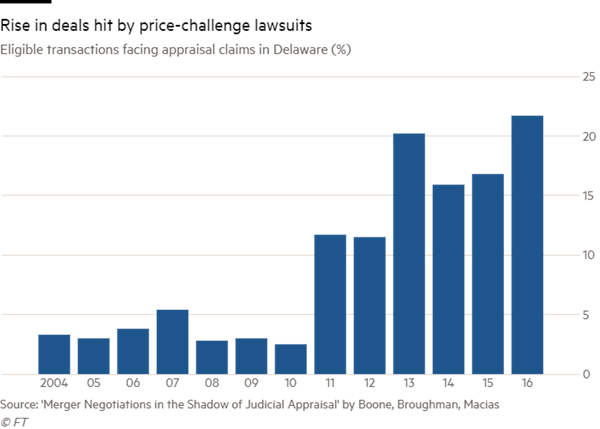|
Equity Valuation
Hedge funds face ‘game over’ for buyout
strategy
Ruling in Dell case casts doubt
on popular tactic of seeking higher post-deal prices
|

Earlier this month,
the Delaware Supreme Court threw out an award stemming from the
2013 acquisition of Dell © Reuters
|
Sujeet Indap
december 28,
2017
A recent court ruling involving the
$24bn buyout of Dell could mean “game over” for hedge funds that have
profited from asking US judges to boost the prices of takeovers after
they have closed.
Hedge funds such as Merion Capital and
Magnetar have raised a total of more than $1bn from investors in
recent years to fund lawsuits in which they challenge the fairness of
the price paid to acquire public companies. These “appraisal” cases
seek to profit by convincing judges in Delaware, where most US
companies are incorporated, to give them a higher payout.
The funds initially scored a series of
high-profile wins, pushing up the buyout prices paid to dissenting
shareholders in deals involving Dell, Dole Foods and Cox Radio among
others.
But earlier this month, the Delaware
Supreme Court threw out an award stemming from the 2013 acquisition of
Dell, and ruled that the deal price should prevail when a sale process
is demonstrated to have been competitive.
That ruling and similar ones in recent
months are forcing appraisal-focused hedge funds to revisit their
approach. One long-time investor in this area told the Financial Times
that the Dell reversal means “game over” for the strategy. He said
that the initial Dell victory in 2016, among others, had made it too
easy to raise money for the strategy and that many funding sources
would now pull the plug.
However, other investors predicted the
strategy would survive as long as hedge funds became more selective
about picking their targets.
Up to now, the strategy has proved very
popular and lucrative. In 2016, one out of five eligible deals faced
a hedge fund lawsuit seeking a higher “fair value” price, up from less
than one in 20 a decade earlier.
While the hedge funds tended to win only
small awards in most of their cases — in the Dell matter, Silver Lake
and Michael Dell owed hedge funds led by Magnetar Capital roughly $20m
— in some appraisal cases, judges have granted awards in excess of
twice the deal price.
One recent study pegged the annualised returns of appraisal funds
at 33 per cent.
Such success also spawned bigger bets,
notably Merion Capital — created by shareholder attorney Andrew
Barroway — took a $600m stake in the grocer Safeway during the buyout
by rival Albertsons. The investment represented about 10 per cent of
the total deal price.
People familiar with that matter said
that Blackstone’s hedge fund unit had invested $200m in Merion’s $1bn+
fund.
Companies targeted by the appraisal
hedge funds pejoratively labelled their strategy “appraisal
arbitrage”. They pointed out that Merion and some of the others
typically acquired their shares in target companies after a
transaction had been announced with an express plan to challenge the
price in court.
The prevalence of the strategy also
spooked some potential buyers. By early 2016, bankers and lawyers were
noting that merger contracts were increasingly including “appraisal
out” clauses that gave purchasers the option to escape a deal if too
many shareholders challenged the price.
But the tide started to turn this year.
Judges in both the Delaware Court of Chancery and the Supreme Court
ruled against the appraisal funds in several cases, finding that the
merger price or even a lower price constituted fair value in the
acquisitions of such companies as Clearwire, Petsmart and DFC Global.
Now the Dell ruling has given buyers
very clear guidance on how to avoid being second guessed on the deal
price in the future, company advisers say.
In that case, Delaware vice-chancellor
Travis Laster had used his own models to determine that Dell’s fair
value per share was $17.62 rather than the $13.75 that Silver Lake
Partners and Michael Dell had paid. He ordered the buyers to
pay the difference.
But Delaware high court said earlier
this month that Mr Laster had inappropriately dismissed the extensive
sales process that Dell had undertaken.
“The recent Dell and DFC decisions
indicate that it will be difficult for hedge funds to do better than
market price where a deal had a strong sale process,” says Adam Gold,
an attorney at Ross Aronstam & Moritz, a Delaware law firm that
represents companies.
Appraisal investors and lawyers who work
with them agree that the ground has shifted. Some of them complain
that the Delaware judges have now become too deferential to companies
and too willing to accept deal purchase prices.
“If Delaware wants to gut appraisal to
be the most corporate-friendly jurisdiction in the world, that will
have consequences which include fewer shareholder protections and
lower valuations”, says Geoffrey Stern, who won an appraisal award
connected to DFC Global, only to have it overturned by the Supreme
Court.
But other investors who follow this
strategy say they believe it can still survive.
Matthew Giffuni, a longtime appraisal
investor at Quadre Investments, says the cases that have made it to
court tend to be the weaker ones because companies are quick to settle
the most compelling cases of undervaluation.
“Dissenters with strong facts have
gotten companies to settle for favourable outcomes prior to trial but
the public does not know the details,” he says. “Appraisal is not
going away. There will always be deals unfair to
shareholders.”
COMMENTS
|
LRosenthal |
December 29, 2017 |
The reporter left out
something very important that the court cited in their ruling. That
is, the presumption that markets are efficient should be taken as a
given. The importance of this is cited several times in the decision.
Unfortunately, the Delaware Court needs to catch up with the finance
profession. Indeed, the Nobel (pardon the incorrect use of words)
committee in economics has come to realize that there is no monolithic
view on efficient markets. As is well known, in 2013, there were two
awards - one to the most ardent believer in efficient markets (Fama)
and the other to someone who believes that efficient markets must be
leavened with the understanding that human behavior plays an important
role in markets (Shiller). In 2017, the most ardent proponent of the
role of human behavior in economics and finance (Thaler) with its
impact on markets as well gets a Nobel in economics. (It should be
noted that even Thaler is not an absolutist and does not say markets
are completely inefficient. He thinks that human behavior must be
understood as having an important important role in economics and
finance.
This writer thinks that the
Delaware Court can improve its decision making with regard to
appraisal if it better understands that an absolutist view of
efficient markets is no longer accepted as an explanation of how
markets operate. For the record, this writer is a long time finance
professor who teaches EMH as part of undergrad and grad investment
finance courses.
Copyright The Financial Times Limited 2017.
|

